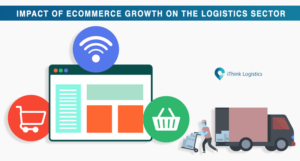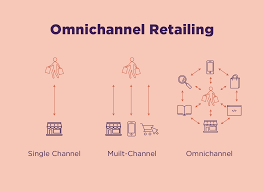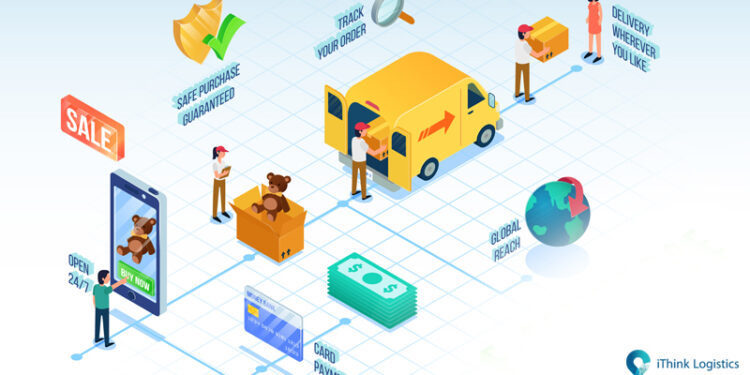How E-commerce is revolutionizing logistics and shaping the future of supply chain management
Introduction:
The past few years have seen a surge in e-commerce activity, with online sales accounting for an increasing share of the retail market. In 2023, this trend is expected to continue, as more and more consumers turn to digital channels to purchase goods and services. As a result, logistics providers are being forced to adapt to the changing landscape, leveraging technology and new strategies to meet rising demand and improve the customer experience.

Changing Customer Expectations:
One of the key drivers of change in the logistics industry is the evolving expectations of customers. With the rise of e-commerce, consumers have become accustomed to fast and convenient delivery options, such as next-day or even same-day shipping. This has put pressure on logistics providers to develop more efficient and flexible delivery networks, with real-time tracking and on-demand delivery becoming the norm.
Technology and Automation:
To meet these demands, many logistics companies are turning to technology and automation. From autonomous delivery vehicles to warehouse robots, technology is being used to streamline operations and improve efficiency. This not only helps to meet customer expectations for fast and reliable service but also reduces costs and minimizes the risk of human error.
The Rise of Fulfilment Centers:
Another key trend in e-commerce logistics is the rise of fulfilment center’s. These are dedicated facilities where orders are processed and shipped directly to customers, often with the help of automation and robotics. Fulfilment center’s can be strategically located to reduce delivery times and costs, and many logistics companies are investing heavily in these facilities to stay competitive.
Sustainability and Environmental Concerns:
As e-commerce continues to grow, there is a growing concern about its impact on the environment. With more products being shipped directly to consumers, there is a need for logistics providers to find more sustainable and environmentally-friendly ways of operating. This has led to a focus on electric vehicles, alternative fuels, and other green initiatives, which not only benefit the environment but also help to improve the image of logistics companies in the eyes of consumers.

The impact of e-commerce on logistics in 2023 is significant, with the industry undergoing a period of rapid change and innovation. From technology and automation to fulfilment center’s and sustainability, logistics providers are adapting to meet the evolving needs and expectations of customers. As e-commerce continues to grow, it will be important for logistics companies to stay ahead of the curve, investing in new technologies and strategies to stay competitive and meet the changing demands of the market.
Omni-Channel Retailing and Multi-Channel Distribution:
Another key trend impacting logistics in 2023 is omni-channel retailing, which refers to the practice of offering customers a seamless shopping experience across multiple channels, including online, in-store, and mobile. This requires a multi-channel distribution approach, with logistics providers managing inventory across multiple locations to meet demand and ensure product availability.
To support omni-channel retailing, logistics providers are leveraging technology such as artificial intelligence and machine learning to optimize inventory management and improve supply chain visibility. This allows them to make better decisions about inventory placement, shipping routes, and order fulfilment, ultimately improving the customer experience and reducing costs.

Challenges Facing the Industry:
Despite the many benefits of e-commerce and the innovations being made in logistics, there are still significant challenges facing the industry. One of the biggest challenges is the ongoing labor shortage, which is making it difficult for logistics companies to find and retain qualified workers.
Another challenge is the increasing complexity of supply chains, which are becoming more global and interconnected. This requires logistics providers to be able to navigate complex regulations, tariffs, and other barriers to trade, while also managing the logistics of cross-border shipping.
Cybersecurity is also a major concern for logistics companies, as the industry becomes more reliant on technology and data. Cyberattacks can disrupt operations and compromise sensitive customer information, highlighting the need for robust cybersecurity measures and data protection policies.
The Role of Data Analytics:
Data analytics is playing an increasingly important role in logistics, as companies seek to make more informed decisions based on real-time data. This includes everything from predictive analytics to optimize shipping routes and improve inventory management, to customer analytics to gain insights into consumer behaviour and preferences.
By leveraging data analytics, logistics providers can improve operational efficiency, reduce costs, and enhance the overall customer experience. They can also use data to identify trends and anticipate future demand, allowing them to make more accurate forecasts and better manage inventory levels.

The Importance of Customer Experience:
In the world of e-commerce, the customer experience is everything. With so many options available to consumers, logistics providers need to focus on providing fast, reliable, and convenient service if they want to remain competitive.
This requires a customer-centric approach, with logistics companies investing in technology and strategies that help them to meet the evolving needs and expectations of their customers. From real-time tracking and notifications to flexible delivery options and hassle-free returns, logistics providers are working hard to create a seamless and satisfying customer experience.
In addition to improving customer satisfaction, a focus on customer experience can also help logistics companies to build brand loyalty and differentiate themselves in a crowded market. By providing exceptional service and going above and beyond to meet the needs of their customers, logistics providers can create a competitive advantage that is difficult for others to replicate.
Conclusion:
The impact of e-commerce on logistics in 2023 is significant, with the industry undergoing a period of rapid change and innovation. From technology and automation to sustainability and multi-channel distribution, logistics providers are adapting to meet the evolving needs and expectations of customers.
While there are certainly challenges facing the industry, including labour shortages and cybersecurity risks, the ongoing growth of e-commerce and omni-channel retailing offer significant opportunities for logistics providers. By staying ahead of the curve and investing in new technologies, strategies, and a customer-centric approach, logistics companies can remain competitive and meet the changing demands of the market, while delivering a seamless and satisfying customer experience.



